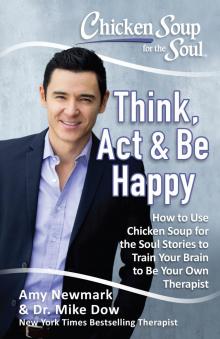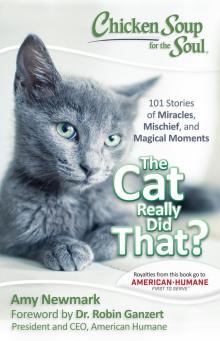- Home
- Amy Newmark
Chicken Soup for the Soul Page 5
Chicken Soup for the Soul Read online
Page 5
• Doors that had so recently opened up to me — workshops and a weekly writing column that meant extra income
• The Christian radio station I’d begun listening to the month before, now playing songs that spoke directly to my wounded heart
• The last book David touched while in the hospital was about getting to heaven
• How often I’d recently caught David gazing at me, the transparency of his utter adoration flustering me with its intensity
It was easy to pinpoint when a distinct shift in our relationship had occurred. Bogged down with financial struggles and raising eight children, I’d lost sight of our marriage to the point that, at our twenty-fifth wedding anniversary party, I wondered if ours was even a partnership to be celebrated. Two years later, David was diagnosed with a cancer that had a fifty percent survival rate. Shocked into awareness of just how much he meant to me, and faced with the prospect of losing him, I made the conscious decision to put my husband first, to be the best caregiver I could be.
One day, after a long morning of radiation and chemotherapy, David collapsed on the couch in exhaustion. I knelt down in front of him, gently removed his socks and shoes, and began rubbing his feet. In twenty-seven years of marriage, I’d never touched that man’s feet. I looked up and saw tears in his eyes. From that pivotal moment, we were true partners in a newly revitalized marriage. From back rubs, to bringing each other cups of coffee, to putting the other’s needs first, we’d actively searched for opportunities to serve each other. Yes, there was much I could be thankful for, even as I grieved the loss of such a special bond.
Choosing thankfulness that morning wasn’t easy, but I’d had a good example in a husband who appreciated everything post-cancer. Despite suffering through six months of grueling treatment, he’d often take my hand in his and remark, “If it took cancer to get this kind of relationship, then I’m glad for it.”
Instinctively, I’d chosen gratitude long before I would learn that science proved the physical and emotional benefits of practicing gratitude in a strengthened immune system, lower blood pressure, and a more positive outlook. I discovered that the word itself derives from the Latin gratia, meaning grace or graciousness. That makes sense. It was through grace that I could look back at my husband’s bout with cancer, grateful for a renewed marriage that lasted another five and a half years. Grace meant falling to my knees at the side of the bed after experiencing his death, thanking God for bringing him into my life in the first place.
I once asked David if he dreaded those birthdays that ended in zero, as I always had. “Not at all. Think of the alternative,” he answered. He was grateful to reach the age of sixty. He died the day before his next birthday.
It’s been seven years since my husband’s death. I’ve filled seven more journals in that time. Occasionally, I’ll revisit that first one, marveling at how, even during those darkest days, I could find something to be thankful for. The attitude of gratitude has served me well. I end even the most mundane journal entries with a notation of something I can be thankful for. Sometimes, it’s as simple as a smile from a stranger in the grocery store, the fresh smell of approaching rain, or the splash of bright yellow on a green lawn.
Recently, I’ve journaled about my fast-approaching birthday ending in zero — the same one that was my husband’s last. I consider his broad smile and response to my question. Did he dread that birthday? On the contrary, he appreciated it. Just as I’ll choose to be grateful for the milestone.
After all, think of the alternative.
— Mary Potter Kenyon —
When “Have To” Becomes “Get To”
Having a baby is a life-changer. It gives you a whole other perspective on why you wake up every day.
~Taylor Hanson
I was utterly exhausted taking care of my first baby. The never-ending cycle of feeding, burping, changing, cuddling, and settling the baby down to sleep was relentless. While my baby napped, I might find time for a quick shower or a moment to unload the dishwasher. Perhaps I would have felt sorry for myself except that I knew how lucky I was to be working this hard.
When he was just a few days old, my son, who had been born healthy, suddenly developed a severe illness that sent him to the Neonatal Intensive Care Unit. One minute, the nurses in the maternity ward were helping me get him ready to go home; the next minute, he had a team of doctors trying to save him. Within a few hours, the crisis passed, but he remained in the hospital for observation for close to a week. We never knew why he got sick or why he got better.
That frightening experience was a reminder not to take anything for granted. It allowed me to remain positive even when motherhood was full of drudgery. So, when my baby’s hungry cries woke me at 2:00 a.m., I reminded myself that I didn’t have to drag myself out of bed to nurse him; instead, I was blessed with the opportunity to do so. When he suddenly spit up all over me, ruining my favorite blouse, I knew I was fortunate that this unexpectedly messy burp was my only concern. And when I had to change all his clothes only moments after getting him dressed, I recognized how lucky I was to have a healthy baby who could make a diaper overflow!
As my son grew older and his younger brother joined our family, I continued to remind myself that I didn’t have to do some of the more boring or disagreeable parental tasks, but that I got to as the mother of two healthy, smart and happy boys. Picking lice and nits out of my younger son’s hair? A yucky job for sure, but also the result of having a vigorous young athlete who shared a batting helmet with other boys on the baseball team. Getting out of the shower to find that my toddler had completely emptied all the books from the bookcase and removed dozens of CDs and DVDs from their plastic cases? Okay, picking up everything and putting it away was going to take me some time, but I understood that the need to explore and touch things was the delightful sign of an energetic child with loads of curiosity. Being jostled by the crowds at the mall as I shopped for a present for yet another birthday party? A small price to pay for having kids who thoroughly enjoyed strong bonds with their classmates and teammates.
Maintaining this positive attitude when my boys were little was made easier by the fact that I was often richly rewarded for my mothering efforts. A trip to the playground would result in fun and laughter. If I made a special dessert, I knew I could count on a kiss of thanks. When I read a favorite storybook at bedtime, I knew there would be an extra hearty goodnight hug.
I remembered that not everyone gets to do these things for their kids.
But when the sullenness of the teenage years arrived, everything I did was wrong. It became harder to convince myself that doing another load of laundry was anything other than a thankless chore when it led to complaints that I was folding pants the wrong way. As dinnertime became a battleground, I began to resent the effort I put into cooking meals that were never really enjoyed by anyone at the table. I’ll have to confess that there were moments when my bickering boys hardly felt like blessings to me.
And then I remembered that not everyone gets to do these things for their kids. My husband’s mother, for example, was losing her fight with cancer when he was a teenager. I’m sure she was heartbroken at the thought that she would no longer be able to take care of her son, make sure he was fed nutritious meals, keep his bureau drawers stocked with clean socks, and see him grow into an adult. Remembering her struggle helps me appreciate how lucky I am that I am here. I am healthy and can still help the children I love so much.
By reframing those everyday chores as things I get to do, I remember that I am living the life I chose. And it’s a wonderful life, at that.
— Victoria Otto Franzese —
Reach Out
The unselfish effort to bring cheer to others will be the beginning of a happier life for ourselves.
~Helen Keller
One Saturday afternoon, tired of all the political news and discord, I disconnected from everything and everyone. I shut off the TV and computer, reached for my car keys and my cam
era, and set off to escape the divisiveness of the world.
Some people escape by shopping or going out for a run. Others bake or play piano or bridge. My go-to is photography. Framing things through a tiny viewfinder — intentionally seeking what is beautiful in this crazy world — has always managed to bring me peace.
That Saturday, I was enjoying a clear blue sky and the golden colors of fall in the Northeast. Just two blocks from my house, while cruising down a quiet street, I came upon a sight that I had to capture. There, in a slant of afternoon light, an old sugar maple was ablaze in color with that bluer than blue sky as a backdrop. There were even golden leaves arrayed all around it in the grass, and behind it were some contrasting evergreens and a white clapboard house with an idyllic, white picket fence. The sight took my breath away.
I hopped out of the car and started firing off pictures, hoping I was a capable enough photographer to do the scene justice.
I went straight home after that and downloaded the photos to my computer. That sugar maple looked as stunning on screen as it did through the viewfinder. I knew it would make a striking photo greeting card — and it would be a perfect image to share for Thanksgiving. I also thought that whoever lived in the shade of that sugar maple might appreciate the picture.
Two weeks later, after the photo greeting cards were printed, notes were written, and all the envelopes were addressed, sealed and ready to mail, I thought again of sending a card to the occupant of that sugar maple house. I didn’t know who lived there, yet I’d been driving and walking by that property for fifty years, from my early childhood.
I wasn’t sure if I should send a card to the occupants of that house. It seemed like an act of kindness, but would it somehow be misconstrued in this age of invasion of privacy? Would whoever lived at that address, after receiving my card, think that I had some ulterior motive or agenda? Would they think I was some sort of voyeur, casing their house like a stalker?
I vacillated. But then, on Thanksgiving morning — after I took stock of all the blessings in my life — I finally took the leap. I jotted a quick note inside one of the photo cards:
I live a few streets over in town and, one day when I was driving past your house this fall, your beautiful tree out front snagged my full attention. Something urged me to share a copy…. Wishing you a bright and beautiful Thanksgiving!
On my way out to celebrate the day, I stopped at that white clapboard house and slipped the photo card inside the mailbox.
Unless I drove by that house, I didn’t give that card another thought… until six months later. In the spring, I received a response:
Just a few days after we received your card with the photo of our sugar maple tree, my husband of forty years passed away. Many years ago, the first fall we moved into this house, the leaves on that sugar maple looked spectacular — as spectacular as they appear on your card… I am in the process of making your photograph the centerpiece of a collage surrounded by photos of my husband and other cherished remembrances of our lives here together… Thank you for sharing the beautiful picture. I’ll treasure it always!
As I read that message, a shiver ran up my spine. I was never so glad to have followed my instinct. It was such a gift to know that my card held — and would continue to hold — special meaning and significance for the occupant of that sugar maple house… but maybe even more so for me.
— Kathleen Gerard —
My Gladitude Journal
Do not measure success by today’s harvest. Measure success by the seeds you plant today.
~Robert Louis Stevenson
A month after purchasing my gratitude journal, I marched into the kitchen and threw it in the trashcan. Writing in it every day felt like a silly addition to my already overwhelming to-do list. Besides, I had been keeping a “normal” journal for years. Why add another?
My friend and mentor urged me to give it another shot. He said that writing down a few things to be thankful for was different from free writing. For the next month, I found myself ending each day by staring at a blank page, wracking my brain for five things to write down. Sadly, after collecting more dust than words, that journal suffered the same fate as the first. Years would pass before “daily gratitudes” became a regular practice for me.
The value of a gratitude journal didn’t resonate with me, but I did continue to write in an ordinary notebook. Jotting down thoughts and ideas was part of my daily ritual. It was a therapeutic way for me to decompress, a safe place where I could contemplate the day’s events and let my dreams, fears and failures spill onto the page.
Along with journaling, consuming motivational material was a constant in my life. I bought dozens of personal-development books and listened to countless podcasts. The overall message from each author was the same: Set ambitious goals. Make a plan. Envision what life will be like once the goal is realized. Work your tail off.
I set goals, created vision boards, planned, and worked tirelessly. But my marathon-sized ambitions never seemed to manifest. The more I focused on the finish line, the more my inner critic told me it would be impossible to cross it. So, I’d give up. Then I’d read a new book, set more goals and start again.
My health goals were accompanied by diet and exercise, and I imagined myself a lean size 6. But when I looked in the mirror or stepped on the scale, I was discouraged. I pictured myself preparing meals in my newly remodeled kitchen, but doubted I’d ever have enough money to make it happen. I visualized authoring a book and seeing it on library shelves. But every time a manuscript was rejected I told myself writing was a waste of time. The coveted finish line had inched so far away that it was barely visible.
The read-practice-believe routine was exhausting and began to chip away at my self-confidence. Something was missing. What was I doing wrong? Recently, while organizing a cabinet, the answer came to me.
I came across the collection of journals I’d accumulated over the years. On a whim, I decided to flip through them. As I read, I realized these tattered notebooks were a roadmap of my past — a detailed narrative of my journey. Miles of blue ink flowed into hundreds of entries where I confessed my fears and captured fresh ideas. I wrote about new experiences and chronicled the events of everyday life. Each page-turn led me closer to the person I am today.
The more I read, the more I realized I was witnessing a transformation. Somewhere in those pages, I found the courage to pursue my dreams. I learned lessons, developed new skills and survived heartbreak with renewed strength. These daily scribbles were proof that I had been making progress all along, but had been so focused on the future I was unable to live in the moment. I hadn’t been celebrating the little wins because I didn’t recognize them.
My decision to dip into a stack of old journals taught me more than any self-help book ever has. Looking ahead to see how far I have to go can make the finish line seem unreachable. But enjoying the process and looking back to see how far I’ve come makes every small success feel more like a victory.
I still can’t get into a pair of size 6 jeans, but I’m stronger, happier and fitter now than I’ve ever been. The old kitchen underwent a complete makeover. However, the new windows, fresh paint, updated appliances and modern flooring all came at different stages — over the course of six years. Although my book isn’t published yet, I’ve rediscovered a love for the craft. And allowing myself to get lost in the practice of creating something new every day has given me a restored sense of purpose. Taking time to celebrate when my byline appears in a publication boosts my confidence and empowers me to keep writing.
I hadn’t been celebrating the little wins.
The gratitude journal found its way back into my life. This simple ritual that failed me in the past finally makes sense. But I prefer to call it a “gladitude journal.” At day’s end, it’s where I reflect on what went right and acknowledge the little wins. It reminds me to give myself credit and slow down long enough to honor the process and recognize the progress. And if I see or experience so
mething that makes me smile, I write that down, too.
Whether it’s an essay on its way to an editor or a long walk with my dog, I’m learning nothing is too small to be celebrated. I still believe I can have it all, but I’m wise enough now to know I can’t have it all at once.
— Ann Morrow —
The Day Courage Sat in the Barber’s Chair
Above all, be the heroine of your life, not the victim.
~Nora Ephron
My husband Steve and I loved to navigate our small town of Grover Beach on foot. After breakfast on a Saturday morning, we’d decided to stop at Beach Barbers so Steve could get a haircut. The shop was crowded, but we found seats and passed the time listening to the chatter of other patrons and enjoying the old-fashioned furnishings and atmosphere.
An hour had passed when a handsome couple that I guessed to be in their mid-fifties came in. She was a bit pale, but otherwise they appeared to be in good health. They stood inside the door, so still they might have been mannequins. Then the man reached over and patted his companion on the shoulder. She stepped over to the closest barber, who happened to be Al, the owner.
The woman cleared her throat several times before she spoke. The chatter dropped a few decibels, and several customers looked up. A feeling of suspense seemed to settle over the shop. The other barbers stood still with their scissors and combs suspended a few inches from the heads of their clients. It was as though someone had pushed a pause button.

 Chicken Soup for the Soul
Chicken Soup for the Soul The Joy of Less
The Joy of Less Hope & Miracles
Hope & Miracles The Cat Really Did That?: 101 Stories of Miracles, Mischief and Magical Moments
The Cat Really Did That?: 101 Stories of Miracles, Mischief and Magical Moments The Joy of Christmas
The Joy of Christmas My Very Good, Very Bad Dog
My Very Good, Very Bad Dog My Very Good, Very Bad Cat
My Very Good, Very Bad Cat